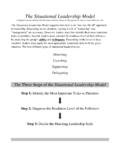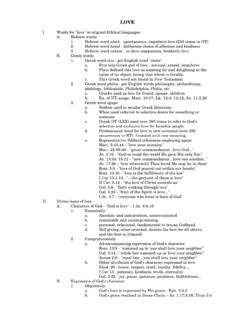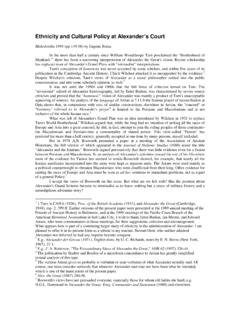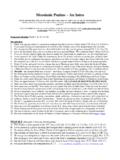Transcription of HLAgenesinMacedoniansandthe - Makedonika
1 Key words:Macedonians; Greeks; Ethiopians;Mediterraneans; Berbers; Sudan; Turks;Egyptians; Sahel; AfricaAcknowledgments:This work was supported in part by grants fromthe Spanish Ministry of Education (PM95-57,PM96-21 and PM99-23) and the Madrid RegionalGovernment (06/70/97 and ). We aregrateful to Alberto Garcia for his help with artdesign work on the 6 October, revised,accepted for publication 20 December 2000 CopyrightcMunksgaard 2001 Tissue Antigens. ISSN 0001-2815 Tissue Antigens2001:57: 118 127 Printed in Denmark . All rights reserved118A.
2 Arnaiz-VillenaHLA genes in Macedonians and theK. Dimitroskisub-Saharan origin of the GreeksA. PachoJ. MoscosoE. Go mez-CasadoC. Silvera-RedondoP. VarelaM. BlagoevskaV. ZdravkovskaJ. Mart nez-LasoAbstract:HLA alleles have been determined in individuals from the Re-public of Macedonia by DNA typing and sequencing. HLA-A, -B, -DR, -DQallele frequencies and extended haplotypes have been for the first timedetermined and the results compared to those of other Mediterraneans, par-ticularly with their neighbouring Greeks. Genetic distances, neighbor-join-ing dendrograms and correspondence analysis have been performed.
3 Thefollowing conclusions have been reached: 1) Macedonians belong to the older Mediterranean substratum, like Iberians (including Basques), NorthAfricans, Italians, French, Cretans, Jews, Lebanese, Turks (Anatolians), Ar-menians and Iranians, 2) Macedonians are not related with geographicallyclose Greeks, who do not belong to the older Mediterranenan substratum,3) Greeks are found to have a substantial relatedness to sub-Saharan (Ethiop-ian) people, which separate them from other Mediterranean groups. BothGreeks and Ethiopians share quasi-specific DRB1 alleles, such as *0305,*0307, *0411, *0413, *0416, *0417, *0420, *1110, *1112, *1304 and * distances are closer between Greeks and Ethiopian/sub-Saharangroups than to any other Mediterranean group and finally Greeks clusterwith Ethiopians/sub-Saharans in both neighbour joining dendrograms andcorrespondence analyses.
4 The time period when these relationships mighthave occurred was ancient but uncertain and might be related to the displace-ment of Egyptian-Ethiopian people living in pharaonic highly polymorphic HLA system has been validated as useful fordistinguishing and/or relating populations (and individuals) in manyresearch studies since the first International HLA AnthropologyWorkshop (Evian, 1973) and in all the subsequent seven InternationalWorkshops. HLA gene frequencies correlate with geographically re-lated populations. The existence or absence of gene flow amongneighbouring ethnic groups may be assessed with the study of HLAfrequencies and the corresponding genetic distances (1, 2).
5 Ancient Macedonians were among the peoples that lived be-tween northern Greece (Thessaly) and Thrace in the Balkans andwere considered by the classical Greeks as non-Greek barbarians that could not participate in the Greek Olympic Games (3). Hero-Authors affiliations:A. Arnaiz-Villena1*,K. Dimitroski2*,A. Pacho1,J. Moscoso1,E. Go mez-Casado1,C. Silvera-Redondo1,P. Varela1,M. Blagoevska2,V. Zdravkovska2,J. Mart nez-Laso11 Department of Immunologyand Molecular Biology, de Octubre, UniversidadComplutense, Madrid, Spain,2 Tissue Typing of BloodTransfusion, of Macedonia*The contribution by and is equal and theorder of authorship isarbitraryCorrespondence to:Antonio Arnaiz-VillenaDepartamento deInmunolog a y Biolog aMolecularH.
6 12 de OctubreUniversidad ComplutenseCarretera Andaluc a28041 MadridSpaine-mail: biolmolArnaiz-Villena et al : HLA genes in Macedoniansdotus wrote that Macedonians were Dorians and were neveradmitted to the Greek community (4). They did not speak Greekbut another language presently unknown and of which only propernames remain; nowadays, they speak a Slavic language (5). Mace-donians fought against the Greeks between 357 336 underKing Philip II. They defeated the Greeks at the Battle of Chaironea(338 ).
7 The Macedonian empire extended from the Balkan Penin-sula to the Himalayas and to North Africa during the reign of Phil-ip s son, Alexander the Great (6). Thereafter, Macedonia was conqu-ered by the Romans and has been disputed in more recent times bySerbs and/or Bulgars. Ottoman Turks controlled Macedonia be-tween 1380 1912 , and it was integrated into Yugoslavia in1946. In 1991, after the partition of Yugoslavia, a referendum gaveMacedonia its independence. The present ethnic groups within thecountry are: 1) Macedonians: 1,279,000; 2) Albanians: 377,000; 3)Turks: 87,000; 4) Serbs: 44,000; and 5) others: 40,000.
8 The northern-most region of Greece is also known as Macedonia and this is whyGreece has opposed the independence of the country while it bearsthe same name (7).Furthermore, we have found that the Greeks did not cluster to-gether with other Mediterranean populations, including both west-ern (Iberians, Algerians, Berbers) and eastern (Cretans, Jews, Leb-anese, Egyptian, Turks-Anatolians) Mediterraneans (8 10).The aim of the present work is to determine the relative contri-butions of Macedonians and Greeks to the present-day genetic poolof Mediterranean peoples.
9 For these purpose, both HLA class I andclass II DNA typings have been studied in Macedonians for the firsttime. The genetic relationship of Macedonians and Greeks to otherMediterraneans, including North Africans (Berbers from Agadirand El Jadida areas and Algerians from Algiers), Iberians (Spani-ards, Basques and Portuguese) and Greeks (from Attica, Aegeanand Cyprus) were calculated. In addition, sub-Saharan and otherAfricans were compared with all available Mediterranean groups inorder to solve the question of the unique Greek HLA and methodsPopulation samplesSamples from one hundred and seventy-two unrelated Macedoniansin Skopje (Institute of Blood Transfusion, Tissue Typing Labora-tory), the Republic of Macedonia capital, were used for HLA geno-typing and phylogenetic calculations.
10 All were Macedonian lan-guage speakers and their ancestors did not belong to a countryminority group (detailed above). The origin of all other populationsused for comparisons is given in Table Antigens2001:57: 118 127 Populations used for the present workIdentificationnumbersRegion and populationn1 References1 Macedonians172 Present study2 Moroccans (El Jadida)98223 Berbers (Souss)98294 Moroccan Jews94305 Spaniards17696 Basques8097 Portuguese228158 French179169 Algerians (Algier)102810 Sardinians911611 Italians2841612 Jews (Ashkenazi)803113 Jews (non-Ashkenazi)803114 Cretans1351015 Greeks (Aegean)85216 Greeks (Attica)96217 Greeks (Cyprus)101218 Lebanese (NS)259219 Lebanese (KZ)393220 Iranians1003221 Turks228 Arnaiz-Villena et al.







